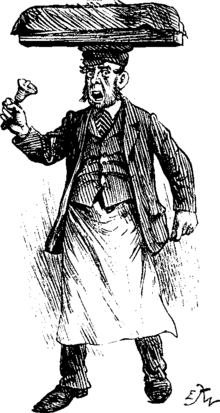The Muffin Man: Difference between revisions
Yelling Bird (talk | contribs) |
No edit summary |
||
| Line 11: | Line 11: | ||
</blockquote> |
</blockquote> |
||
[[Drury Lane]] is a street in [[London]], also notable for its [[Theatre Royal, Drury Lane|theatre]]. [[Victorian era|Victorian]] households had many of their fresh foods delivered; muffins would be delivered door-to-door by a muffin man.<ref>Kiple, Kenneth F and Ornelas, Kriemhild Coneè (2000). ''The Cambridge World History of Food''. Cambridge University Press. p. 1224</ref> The "[[muffin]]s" were the product known in much of the English-speaking world today as [[English muffins]], not just the [[cupcake]]-shaped variety also consumed. {{Fact|date=March 2007}} |
[[Drury Lane]] is a street in [[London]], also notable for its [[Theatre Royal, Drury Lane|theatre]]. [[Victorian era|Victorian]] households had many of their fresh foods delivered; muffins would be delivered door-to-door by a muffin man.<ref>Kiple, Kenneth F and Ornelas, Kriemhild Coneè (2000). ''The Cambridge World History of Food''. Cambridge University Press. p. 1224</ref> The "[[muffin]]s" were the product known in much of the English-speaking world today as [[English muffins]], not just the [[cupcake]]-shaped variety also consumed. {{Fact|date=March 2007}} <p> |
||
It could also refer to the darker era when Drury Lane was lined with Brothels. The "Muffin Man" would have been someone who owned and controlled prostitutes. |
|||
''The Young Lady's Book'', from 1888, describes the song in the context of a game: |
''The Young Lady's Book'', from 1888, describes the song in the context of a game: |
||
Revision as of 00:37, 16 June 2007

The Muffin Man is a traditional nursery rhyme or children's song with English origins. The lyrics are as follows, or similar:
Do you know the Muffin Man?
The Muffin Man, the Muffin Man.
Do you know the Muffin Man?
He lives on Drury Lane.
Drury Lane is a street in London, also notable for its theatre. Victorian households had many of their fresh foods delivered; muffins would be delivered door-to-door by a muffin man.[1] The "muffins" were the product known in much of the English-speaking world today as English muffins, not just the cupcake-shaped variety also consumed. [citation needed]
It could also refer to the darker era when Drury Lane was lined with Brothels. The "Muffin Man" would have been someone who owned and controlled prostitutes. The Young Lady's Book, from 1888, describes the song in the context of a game:
The first player turns to the one next her, and to some sing-song tune exclaims:
- "Do you know the muffin man, the muffin man, the muffin man?
- Do you know the muffin man who lives on Drury Lane?"
The person addressed replies to the same tune:
- "Yes, I know the muffin man, the muffin man, the muffin man;
- Oh, yes, I know the muffin man, who lives on Drury Lane."
Upon this they both exclaim:
- "Then two of us know the muffin man, the muffin man," &c.[2]
Misinterpretations
Children often misinterpret the word drury in the last line for "cherry". Others mishear it as "smeary".
Modern-day references
Dreamworks' "Shrek" featured a reference to the popular song, in the form of an interrogation between Lord Farquaad and Gingy, as follows:
Lord Farquaad: Run, run, run, as fast as you can; you can't catch me, I'm the Gingerbread Man!
Gingy: You're a monster.
Lord Farquaad: I'm not the monster here, you are. You and the rest of that fairy tale trash, poisoning my perfect
world. Now tell me! Where are the others?
Gingy: Eat me! [spits]
Lord Farquaad: [grunts] I've tried to be fair with you creatures, but now my patience has reached its end!
TELL ME, OR I'LL ---
Gingy: No, not the buttons! Not my gumdrop buttons!
Lord Farquaad: All right, then, who's hiding them?!
Gingy: Okay, I'll tell you. Do you know the muffin man?
Lord Farquaad: The muffin man?
Gingy: The muffin man.
Lord Farquaad: Yes, I know the muffin man. W-Who lives down Drury Lane?
Gingy: Well, she's married to the muffin man...
Lord Farquaad: The muffin man?
Gingy: The muffin man!
Lord Farquaad: She's married to the muffin man...
- ^ Kiple, Kenneth F and Ornelas, Kriemhild Coneè (2000). The Cambridge World History of Food. Cambridge University Press. p. 1224
- ^ Mackarness, Matilda Anne Planche (1888) The Young Lady's Book: A Manual of Amusements, Exercises, Studies, and Pursuits. London: George Routledge and Sons. pp. 278–280. Full book from Google Books.
